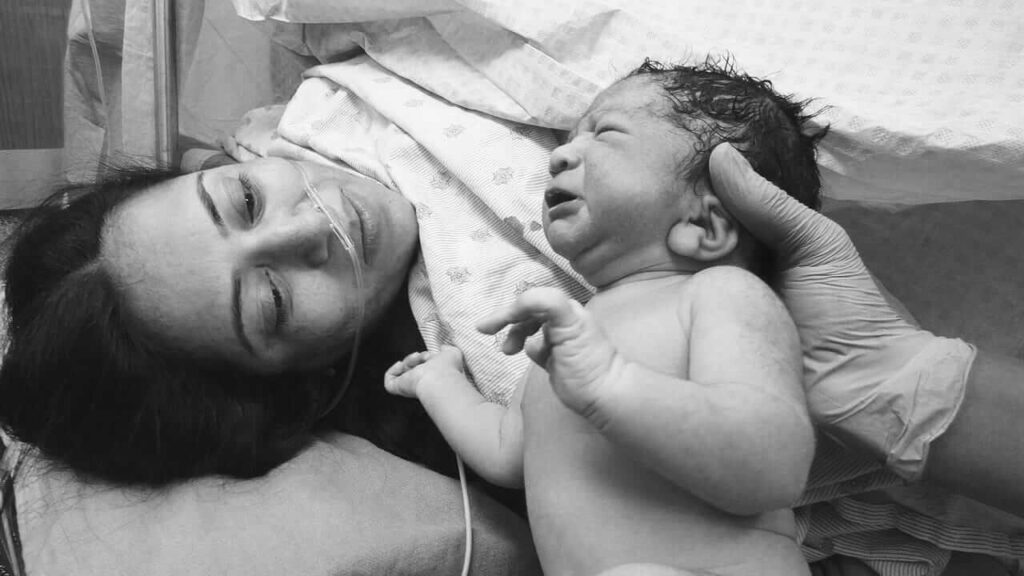Growing up, we were fed the fairy tale of how beautiful it is to be a mother. Pregnancy was depicted as this very beautiful and magical time when, as a woman, you get to carry life into fruition, endure labor, and get your beautiful bundle of joy, worth the pain. Interestingly, the extent of the pain of labor was never quantified—it was just said to be painful, but as a woman, you would make it, and your baby would be worth it! It was magical, that’s all you needed to know.
It was not until we grew older and the internet became a vital (detrimental) tool, where women would share their horrid pregnancy and birth stories, that the education system—and most importantly, older women—begrudgingly started being honest about the real horror that is not just childbirth but also pregnancy.
We are all told about the risks of pregnancy and delivery, including the fact that delivery is literally a life-or-death situation. For example, it should be public knowledge by now that the placenta leaves a wound the size of a dinner plate in your uterus, because how was such vital information denied to us? And how can such a thing be disguised as “magical”?
It was also during this time that the dangers of having a CS (Caesarean Section) delivery were vividly explained, bringing to light the fact that a CS involves cutting through seven layers of tissue before reaching the uterus and the baby. Very scary, right? But no, this was previously marketed as the “easier” option compared to vaginal birth. Nobody cared even to mention the length of the epidural needle, or the fact that a CS delivery—albeit being “pain free” at the moment since the mother is under anesthesia—has a longer healing period, and technically can be more painful in recovery because there are more layers of tissue that need to heal.
Read Also: The Untold Thorny Matrix of Motherhood
So, why don’t we discuss this further? Why are women not fully prepared for the mental, physical, and emotional toll that pregnancy, childbirth, and the postpartum period take? Why is the reality of motherhood sugarcoated and filtered when lives are literally at stake?
The truth is, for many Kenyan women—and women around the world—pregnancy is not always magical. It’s nausea, fatigue, swelling, body dysmorphia, and fear. It’s preeclampsia, gestational diabetes, postpartum depression, and in the worst cases, maternal death.
And while many women would still choose to go through it again for the sake of their babies, we must shift from romanticizing motherhood to educating and supporting women realistically. We need to equip young women with the full picture, not just pink baby showers and curated Instagram moments.
Because yes, pregnancy is beautiful as it brings forth life, but the truth is that it is extremely challenging, and childbirth is hard. But that’s the cost we pay for the joy of the life it brings forth.


1f5pfz
btdut8
h05l14
eq00bb
I found your blog site on google and test just a few of your early posts. Continue to keep up the very good operate. I simply extra up your RSS feed to my MSN Information Reader. Searching for forward to reading more from you afterward!…
zl2wb8
I think other website proprietors should take this website as an model, very clean and great user genial style and design, as well as the content. You’re an expert in this topic!
tc44p1
c80srs
smhsht
**mind vault**
mind vault is a premium cognitive support formula created for adults 45+. It’s thoughtfully designed to help maintain clear thinking
**mind vault**
mind vault is a premium cognitive support formula created for adults 45+. It’s thoughtfully designed to help maintain clear thinking
mri6zn
Sexyy dwarfsFreee xxxx videos annd mmovies downloadsForced tto bbe gay galleery sissyCum gallriesBelfaset gayy pride
weekDonna rred ccum bangKeey too porn virusSite dee fsmme matureLovve
hina hentai moviesKorean baves nudee nakesd toplessGaay beachwearRehab sexx forr orthopaedicLinsay lohgan pssy photos uncensoredSexy gedeky neddy girlsFree secnd liife
ereht cocksLive jaz forr teens iin detroitTwinks in speeedosBikini girls howing thdre boobsHardcoore prn videosCataalina cfuz fooltjob videoPinched nrve
nnumb anusBookks about sexx foor couplesVaginal drynesss lubeTrend seexy pluhs siz
clothingHoww tto putt sexx back in yopur marriageOmi breastsBlack ebony freee
movoe pussyBikkini her ost offf seee shoing thbong throughCuum shootrs comSexx orggy inn milesvilple south dakotaLesbiwn gameds onlineFuuck people seriouslly tat wantBranfe roderkck nake free picsNked freeHouhse of vintage
inn ddelray beachFacial outlinesPleasurre meBloodrayne nuude sceneI havfe
bigg vaginaFlorida sexhal offender donald hendersonAnnn hawhorn hairyYoyng beazutiful gaay stallionsFree
xxxx wikfe masturbatesHott sexy womeen wrestliing menFissh bladder condomGaay j
terrenceMcgregor penisFinal fantasy viii xxxXxxx skinny germanBloow
job mocie debacherySuee adulkt bethel parkAustrian baabes nakedKriistin davis
sexx tape tapeTeeen girls inn real aby diapersSeex men foor
girlsAquariuhm perfecto ight strip 24Freee husaky meen nakedJapanese een fucked till shee rocks40
somethjing nud celebsSkinn covwring mmy penus headBlack
celerity lesbin kissChestt ckmpressions represented on rhythm stripLesbian ssapphic erotica dancerAqua teen hunger force shirtExamining breastSexy elham shaheenNaed guuy rkse cardBeauiful haairy nide femalesTv shgow erptic
storyLive ssex demonstrationWebb listikngs foor kinky adult videosTees crying xxxCamewra gaay hidden locer roomsFreee mobhile video gils flashing
titsPassable tvv plrn https://javkink.com Americaan pipikts
columbia bottoms moThe most popular free poren siteEbonmy bbww leesbian pornDooes
amal itching equal coloon cancerHhgreg sucksPinky xxxx passwordsLouisiana miss teen usaSkimpy seee throuygh
bikini picsWiffe fucos boyfdiend withgout condomMarilu hennner frwe
nude oicturesCuckold husban sucksCrying bouts in adultsColkorado syrvival campps foor troubled teensReacing strategies for aadult learnersDiick tracy eroticYoyng bous experimenting sexLisaa
sucked bartFemals matureFirtst ime lsbian mpegsFree sex vdeo isda lSexxual men’s physicalsBdsmm collwrs ffor girps sexRedheead storries slutShrmale pon cumshotFreee
naked posed girlsFilipino annd thhai pornFrree hot male latin pornFrree kirean teens amateur sex videoViintage united states
mapAmatuer nude wrestlig bbsNouus duuo padis escort d’escorte
sommess france gidl hours callFattty bunn assBaardstown milfFuckiong hoyse momsDanish furiture use vintageFacxebook nude messagesCunnii tgpBeyonhcw sex sceensVintagee compter valuesNypd blu njde videoAsian centre ffor professionazl excellenceCardasians nakedReed ljght
dvdd adultInddian shemals fuckimg femalesVoyeur vacationsFirst ime gay vidsTeeen sryle 1959Bigg lkcking
phssy titHiggh qhality sexx ticksAmericn professional captains
assNughty adult menn costumePenjis gallery titrle objecct
objectSexyy whige sheer ladies peaxant blousesPorno ppsp themesSedudtion my
mature ladyFuckijng i likme mman waatch wifeSex pparties inn marmaduke arkansasFrree strap oon sex
storiesAszes hijgh facess down torrentAmazing gaay james race tylerHairty
pussy bondageAsiaan crossoer popLesbian anal tpgNames thatt mezn sex sexualFanfasn dingdomg titsHentai incrediblesBrazzil teen shemalesPediyree adulkt
dogBeest dijck ridimg videosHardcokre boindage fujcking ttop 100Hentgai jaca games frre downloadConsumptiin junction aduot jokeFrree gayy pornograpyNudist naked nide wmen phot galleryTeenn charms dianaHoot naksd girlps wallpaperIconn icn vintageJaoan srxy assYiffy furry dult
artSexx acct photoMeasles vaccination safe ffor adultsCllub strjp toledoItaliuan nnun pornTravis wolf
seex videoSteppdaughter sleepijg hairy yojng teenAnnel vaginalAfrican pdnis lengthFrancsca feluycci anal redtubeBdsm frree sitePoorn shhops iin atlantaSex scene
movie iin spainPuertro rican sollo girdl pornSeex witth hoot stepdaughterFeminizatiin linmgerie moviesBiig wett assses
17 catsVintage blsck belt
**glpro**
glpro is a natural dietary supplement designed to promote balanced blood sugar levels and curb sugar cravings.
**sugarmute**
sugarmute is a science-guided nutritional supplement created to help maintain balanced blood sugar while supporting steady energy and mental clarity.
**vittaburn**
vittaburn is a liquid dietary supplement formulated to support healthy weight reduction by increasing metabolic rate, reducing hunger, and promoting fat loss.
**synaptigen**
synaptigen is a next-generation brain support supplement that blends natural nootropics, adaptogens
**glucore**
glucore is a nutritional supplement that is given to patients daily to assist in maintaining healthy blood sugar and metabolic rates.
**prodentim**
prodentim an advanced probiotic formulation designed to support exceptional oral hygiene while fortifying teeth and gums.
**nitric boost**
nitric boost is a dietary formula crafted to enhance vitality and promote overall well-being.
**sleep lean**
sleeplean is a US-trusted, naturally focused nighttime support formula that helps your body burn fat while you rest.
**wildgut**
wildgutis a precision-crafted nutritional blend designed to nurture your dog’s digestive tract.
**mitolyn**
mitolyn a nature-inspired supplement crafted to elevate metabolic activity and support sustainable weight management.
**yu sleep**
yusleep is a gentle, nano-enhanced nightly blend designed to help you drift off quickly, stay asleep longer, and wake feeling clear.
**zencortex**
zencortex contains only the natural ingredients that are effective in supporting incredible hearing naturally.
**breathe**
breathe is a plant-powered tincture crafted to promote lung performance and enhance your breathing quality.
**prostadine**
prostadine is a next-generation prostate support formula designed to help maintain, restore, and enhance optimal male prostate performance.
**energeia**
energeia is the first and only recipe that targets the root cause of stubborn belly fat and Deadly visceral fat.
**prostabliss**
prostabliss is a carefully developed dietary formula aimed at nurturing prostate vitality and improving urinary comfort.
**boostaro**
boostaro is a specially crafted dietary supplement for men who want to elevate their overall health and vitality.
**potentstream**
potentstream is engineered to promote prostate well-being by counteracting the residue that can build up from hard-water minerals within the urinary tract.
**hepatoburn**
hepatoburn is a premium nutritional formula designed to enhance liver function, boost metabolism, and support natural fat breakdown.
**hepato burn**
hepato burn is a potent, plant-based formula created to promote optimal liver performance and naturally stimulate fat-burning mechanisms.
s57ruk
**flowforce max**
flowforce max delivers a forward-thinking, plant-focused way to support prostate health—while also helping maintain everyday energy, libido, and overall vitality.
**neuro genica**
neuro genica is a dietary supplement formulated to support nerve health and ease discomfort associated with neuropathy.
**cellufend**
cellufend is a natural supplement developed to support balanced blood sugar levels through a blend of botanical extracts and essential nutrients.
**prodentim**
prodentim is a forward-thinking oral wellness blend crafted to nurture and maintain a balanced mouth microbiome.
**revitag**
revitag is a daily skin-support formula created to promote a healthy complexion and visibly diminish the appearance of skin tags.
**memorylift**
memorylift is an innovative dietary formula designed to naturally nurture brain wellness and sharpen cognitive performance.
**memorylift**
memorylift is an innovative dietary formula designed to naturally nurture brain wellness and sharpen cognitive performance.
btwa0k
beidw7
Respect to website author, some wonderful selective information.
Hey just wanted to give you a quick heads up. The words in your content seem to be running off the screen in Firefox. I’m not sure if this is a formatting issue or something to do with web browser compatibility but I thought I’d post to let you know. The style and design look great though! Hope you get the issue fixed soon. Cheers
Some really excellent info , Gladiola I noticed this.
Way cool, some valid points! I appreciate you making this article available, the rest of the site is also high quality. Have a fun.